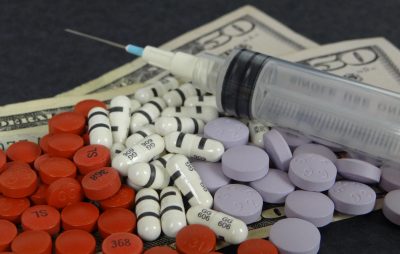Coronavirus Escalates a Pharmaceutical Arms Race

In each era, it is possible to detect a central factor in the struggle for power between nations, which, when achieved, will enable the nation that conquered it to be at an advantageous stage in relation to all the others that have not yet obtained it. The Argentine scholar Marcelo Gullo called this factor a “threshold of power”. The first threshold would have been the National State, the second was the industrialization, the third was the acquisition of territories during the neocolonial period, the fourth was the atomic bomb and the fifth is not yet perfectly determined, but it is linked to the new technologies of the post-atomic age. In a world increasingly devastated by the effects of a global pandemic, where all countries invest everything they have in researching medicines and vaccines against the new coronavirus, we can reflect more deeply on what the new and current “threshold of power” would be.
In England, scientists started on April 23 the first clinical trials in humans of a new experimental vaccine. The information was confirmed by UK Health Secretary Matt Hancock on Wednesday. According to the secretary, the project is receiving state funding of £20 million. These are his words: “We will support them to the end and give them the resources they need to improve their chances of success”. According to infectologist Andrew Pollard, who leads the research project, the Oxford vaccine center will produce one million doses of the vaccine by September, even though it is in the period of clinical trials, which in itself already reveals how much the project is a bet by the United Kingdom. The English objective is to produce a vaccine before the deadline of one year as stipulated by the World Health Organization, which, undoubtedly, would put the British in an advantage over almost all nations.
Germany also hopes to take advantage on this race. The German government authorized the first clinical trials of a vaccine against the new coronavirus. Two hundred healthy people will participate in the first phase of the tests. Scientists are trying to verify the development of immunity and want to include more people in the tests in a second step of the experiments. But the president of the Vaccination Institute warned that the process will take months before any vaccine is approved and become available to the population at health centers in the country. Leading research to develop the vaccine in Germany are the pharmaceutical corporation Pfizer and the biotechnology company BioNTech SE. Both companies are also awaiting authorization to start clinical trials in the United States.
China, the first country to control the infection, has a position of relative advantage over the other countries, which were later affected. Beijing began clinical trials of an experimental vaccine in March, with doses administered to more than 100 volunteers between 18 and 60 years old in the city of Wuhan. For six months, the volunteers will be followed up, which is why there are no results yet identified regarding the vaccine’s effectiveness. Also in March, the United States began testing an experimental vaccine where the biotechnology company Moderna Therapeutics is conducting the research. Vaccinated volunteers will also be accompanied for the next months.
Russia has announced that it will be ready to start testing its experimental vaccines on humans from June. Rinat Maksiutov, who runs the Vektor state center, said that he plans to carry out the first phase of testing three vaccines on 180 volunteers from 29 June. “Volunteer groups have already been created. We received more than 300 applications”, explained Maksiutov. According to the director, scientists at his laboratory, located in the Siberian city of Novosibirsk, developed the vaccine prototypes based on six different technological platforms. Currently, tests continue to be performed on animals. The most promising prototypes will be announced until April 30, when they will be sent for human testing.
There are still other different vaccine projects underway. As we can see, some of the most powerful nations of the world are in a notorious race to develop their own vaccine, which would represent for the respective State a true pharmaceutical autonomy and an extreme advantage in the era of epidemics. In fact, the new coronavirus has brought us a very significant change in the world order, even though we are still far from knowing its greatest effects: we are already in an age of epidemics and pandemics, and the nation that currently obtains pharmaceutical sovereignty will have reached the newest “threshold of power”.
During the Cold War, the atomic bomb represented the limit of national sovereignty. The Soviet Union and the USA competed with each other in a major arms race, in which the nations sought to gain an advantage through war superiority. Currently, in the context of hybrid war and possibly biological weapons, the most powerful nations cannot be content with nuclear power, but must be concerned with investing in biological and pharmaceutical research for defense purposes. Vaccine has become synonymous with power. What we are seeing now is a new arms race, where weapons are the instruments to combat deadly plagues, which will become more and more frequent in a context of globalization and massive circulation of people. We have entered the age of pandemics and the race for vaccines.
Still, the worst case scenario would be one in which private corporations control these vaccines, as this would put companies at an advantage over nation states. Interestingly, we are looking at this situation in most of the West.
*
Note to readers: please click the share buttons above or below. Forward this article to your email lists. Crosspost on your blog site, internet forums. etc.
This article was originally published on InfoBrics.
Lucas Leiroz is a research fellow in international law at the Federal University of Rio de Janeiro.

